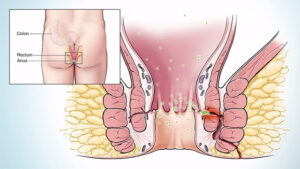Anal Fistula Introduction
An anal fistula is an abnormal tunnel or tract that forms between the inside of the anus or rectum and the surrounding skin in the anal area. It is usually the result of a previous anal abscess, which is a collection of pus that forms in the tissues near the anus. When an abscess does not heal properly or is not adequately drained, it can lead to the formation of a fistula.
Causes
The primary cause of an anal fistula is an anal abscess. Anal abscesses often occur as a result of an infection in one of the anal glands. These glands are small structures located inside the anus that produce mucus to help with the passage of stool. When an anal gland becomes blocked or infected, it can lead to the formation of an abscess.
The most common causes of anal abscesses that can potentially lead to an anal fistula include:
1. Bacterial Infection: The most common cause of anal abscesses is a bacterial infection. Bacteria naturally present in the anal area can enter the anal gland and cause an infection, leading to an abscess.
2. Obstruction: Anything that blocks the anal gland ducts can increase the risk of developing an abscess. Factors such as constipation, straining during bowel movements, or other conditions that narrow or obstruct the gland openings can contribute to the formation of abscesses.
3. Crohn’s Disease: Crohn’s disease is a chronic inflammatory bowel disease that can affect any part of the digestive tract, including the anus and rectum. Inflammation and damage to the tissues in these areas can increase the risk of developing anal abscesses and subsequent fistulas.
4. Trauma or Injury: Any trauma or injury to the anal area, such as anal surgery, childbirth, or penetrating injury, can disrupt the normal anatomy and increase the likelihood of developing an anal abscess and subsequent fistula.
the anal glands. These glands are small structures located inside the anus that produce mucus to help with the passage of stool. When an anal gland becomes blocked or infected, it can lead to the formation of an abscess.
The most common causes of anal abscesses that can potentially lead to an anal fistula include:
1. Bacterial Infection: The most common cause of anal abscesses is a bacterial infection. Bacteria naturally present in the anal area can enter the anal gland and cause an infection, leading to an abscess.
2. Obstruction: Anything that blocks the anal gland ducts can increase the risk of developing an abscess. Factors such as constipation, straining during bowel movements, or other conditions that narrow or obstruct the gland openings can contribute to the formation of abscesses.
3. Crohn’s Disease: Crohn’s disease is a chronic inflammatory bowel disease that can affect any part of the digestive tract, including the anus and rectum. Inflammation and damage to the tissues in these areas can increase the risk of developing anal abscesses and subsequent fistulas.
4. Trauma or Injury: Any trauma or injury to the anal area, such as anal surgery, childbirth, or penetrating injury, can disrupt the normal anatomy and increase the likelihood of developing an anal abscess and subsequent fistula.
 the anal glands. These glands are small structures located inside the anus that produce mucus to help with the passage of stool. When an anal gland becomes blocked or infected, it can lead to the formation of an abscess.
The most common causes of anal abscesses that can potentially lead to an anal fistula include:
1. Bacterial Infection: The most common cause of anal abscesses is a bacterial infection. Bacteria naturally present in the anal area can enter the anal gland and cause an infection, leading to an abscess.
2. Obstruction: Anything that blocks the anal gland ducts can increase the risk of developing an abscess. Factors such as constipation, straining during bowel movements, or other conditions that narrow or obstruct the gland openings can contribute to the formation of abscesses.
3. Crohn’s Disease: Crohn’s disease is a chronic inflammatory bowel disease that can affect any part of the digestive tract, including the anus and rectum. Inflammation and damage to the tissues in these areas can increase the risk of developing anal abscesses and subsequent fistulas.
4. Trauma or Injury: Any trauma or injury to the anal area, such as anal surgery, childbirth, or penetrating injury, can disrupt the normal anatomy and increase the likelihood of developing an anal abscess and subsequent fistula.
the anal glands. These glands are small structures located inside the anus that produce mucus to help with the passage of stool. When an anal gland becomes blocked or infected, it can lead to the formation of an abscess.
The most common causes of anal abscesses that can potentially lead to an anal fistula include:
1. Bacterial Infection: The most common cause of anal abscesses is a bacterial infection. Bacteria naturally present in the anal area can enter the anal gland and cause an infection, leading to an abscess.
2. Obstruction: Anything that blocks the anal gland ducts can increase the risk of developing an abscess. Factors such as constipation, straining during bowel movements, or other conditions that narrow or obstruct the gland openings can contribute to the formation of abscesses.
3. Crohn’s Disease: Crohn’s disease is a chronic inflammatory bowel disease that can affect any part of the digestive tract, including the anus and rectum. Inflammation and damage to the tissues in these areas can increase the risk of developing anal abscesses and subsequent fistulas.
4. Trauma or Injury: Any trauma or injury to the anal area, such as anal surgery, childbirth, or penetrating injury, can disrupt the normal anatomy and increase the likelihood of developing an anal abscess and subsequent fistula. Symptoms
The symptoms of an anal fistula can vary depending on its location, complexity, and whether it is actively draining or not. Here are some common symptoms associated with anal fistulas:
1. Persistent or Recurrent Pain: Pain is one of the primary symptoms of an anal fistula. The pain is often localized to the anal region and may be continuous or intermittent. It can range from mild discomfort to severe, sharp pain. The pain is usually worsened during bowel movements or when sitting for extended periods.
2. Swelling and Tenderness: The area around the anal fistula may become swollen and tender to the touch. The swelling may feel like a lump or a small bump near the anus.
3. Discharge: An anal fistula often produces a discharge, which may be pus-like or contain small amounts of blood. The discharge may come from an external opening near the anus. It can cause irritation and may stain underwear or toilet paper.
4. Recurrent Infections: Anal fistulas are prone to recurrent infections, which can result in additional symptoms such as increased pain, swelling, redness, warmth, and fever.
5. Itching or Skin Irritation: The presence of an anal fistula can cause itching and irritation in the anal region. The constant drainage and contact with bodily fluids can lead to skin irritation and discomfort.
6. Constipation or Bowel Movement Changes: Some individuals with anal fistulas may experience changes in their bowel movements. This can include constipation or difficulty passing stool due to pain or a sense of incomplete evacuation.
Preventions
While it may not be possible to prevent all cases of anal fistulas, there are certain measures you can take to reduce the risk. Here are some preventive strategies:
1. Promptly Treat Anal Abscesses: Anal fistulas often develop as a complication of untreated or inadequately treated anal abscesses. If you suspect you have an anal abscess, seek medical attention promptly. Abscesses usually require incision and drainage to remove the pus and prevent further complications.
2. Maintain Good Anal Hygiene: Practicing good hygiene in the anal area can help prevent infections and reduce the risk of abscess formation. Keep the anal area clean by gently washing with warm water and mild soap after bowel movements. Avoid using harsh or fragranced soaps that can irritate the area.
3. Avoid Straining During Bowel Movements: Straining during bowel movements can put pressure on the anal area and increase the risk of anal abscesses. To prevent straining, maintain a healthy diet high in fiber and drink plenty of fluids to promote regular bowel movements. If constipation is a problem, consider incorporating fiber supplements or stool softeners under the guidance of a healthcare professional.
4. Manage Chronic Conditions: If you have a chronic condition such as Crohn’s disease, take steps to manage it effectively. Follow your healthcare provider’s recommendations, take prescribed medications as directed, and attend regular check-ups to monitor and address any issues promptly.
5. Practice Safe Anal Intercourse: If you engage in anal intercourse, take precautions to minimize the risk of trauma or infection. Use plenty of water-based lubrication to reduce friction, and communicate openly with your partner about comfort and boundaries. Avoid engaging in rough or forced anal intercourse, as it can increase the risk of anal injury.
6. Maintain a Healthy Lifestyle: Adopting a healthy lifestyle can support overall wellness and reduce the risk of certain conditions that can lead to anal fistulas. This includes regular exercise, a balanced diet, maintaining a healthy weight, managing stress, and avoiding smoking.

